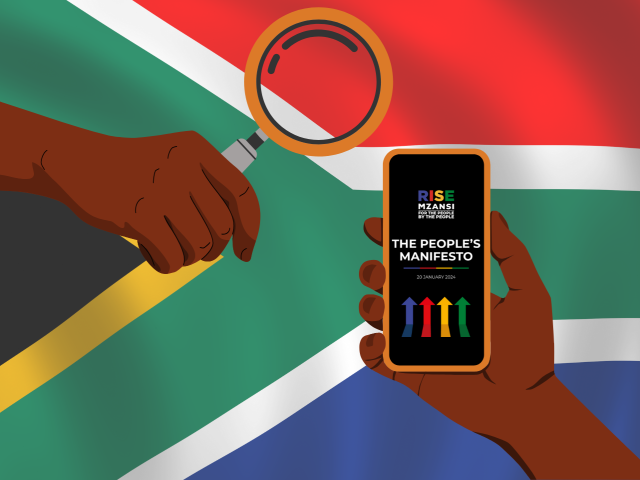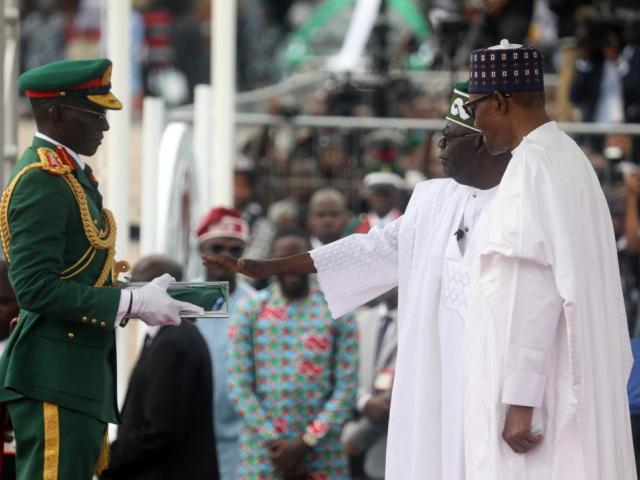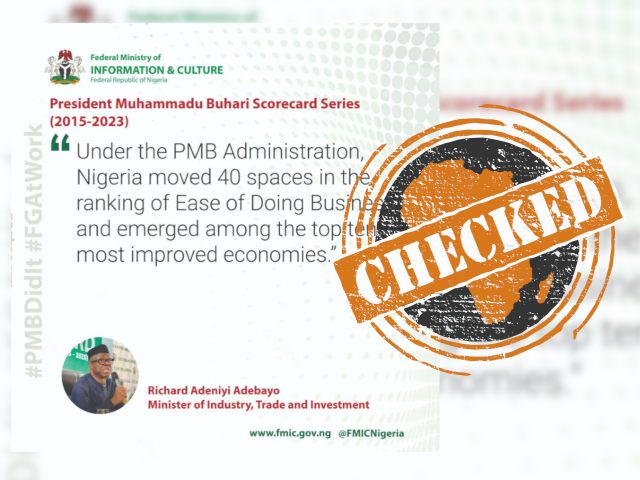-
The newspaper misquoted deputy governor Femi Hamzat’s claim comparing inflation in Nigeria and in Senegal. But what Hamzat actually said was also incorrect.
-
The deputy governor was mostly correct that prices have gone up three times in the Nigerian state of Kaduna, if looking from 2015 to 2023.
-
However, available evidence does not support the claim that prices have increased 15-fold in Senegal over eight years.
A national newspaper in Nigeria recently carried a striking headline about inflation.
“Video: My Senegalese friend said prices of things in Senegal are 15 times more than Nigeria,” read the headline of a 29 June 2023 article in the Vanguard.
The paper attributed the claim to Femi Hamzat, the deputy governor of Lagos, Nigeria’s economic hub. According to the article, an unnamed friend of Hamzat’s had told him Nigerians complained too much about the cost of living.
“I have a Senegalese friend. His father a Senegalese. His mother a Nigerian. He said – I don’t know if I agree with him – he said: ‘My brother, it seems Nigerians are one of the least patriotic people in the world,” the deputy governor reportedly said.
“I said: ‘Why did you say that?’ He said: ‘Prices of things in Nigeria is about three times but in Senegal, it is about 15 times, but you people keep complaining’.”
The comments provoked a range of reactions, adding to the public debate on inflation and the high cost of living in Nigeria. Some criticised Hamzat, a leader of the ruling party, for making light of the economic suffering of Nigerians.
But did the politician get his facts right? We checked.
This claim forms the headline of the article. But it is different from what is directly attributed to Hamzat in the body of the report.
The article quotes Hamzat as saying that his friend said the prices of things had gone up by three times in Nigeria but by about 15 times in Senegal.
To establish the actual claim, we watched the Channels TV video the paper cited as the source. Hamzat was speaking at a ceremony to mark the Muslim holiday of Id el Kabir.
In the video, Hamzat says of his friend: “He said prices of things in Kaduna is about three times, but in Senegal it’s about 15 times. You people, you complain too much.”
Kaduna is a state in the country’s northwestern region. The newspaper quoted Hamzat as though he was referring to the whole country, using the state as a proxy for Nigeria.
That said, is the newspaper's headline accurate?
‘Not a straightforward comparison’
Experts told Africa Check that it was not accurate to make a direct comparison between the prices of unspecified items in Nigeria and Senegal.
Differences in important factors such as adequate rainfall, good monetary and fiscal policies and the impact of exchange rate depreciation should be taken into account, Dr Baba Madu, head of national accounts at the Nigerian National Bureau of Statistics (NBS), said.
“In fact, as for inflationary indicators, it is difficult to compare because in all the French-speaking West African countries, Senegal included, the inflation rate is controlled by a single central bank as well as influenced by the French government.”
Madu was referring to the Central Bank of West African States (BCEAO) based in Dakar, Senegal. The bank is the common issuing institution for the eight-nation West African Monetary Union.
The bank holds a central cash reserve, issues currency, manages monetary policy, organises and supervises banking activities, and provides assistance to member countries.
Imported inflation
Although most African countries and other developing countries had some economic factors in common, this kind of comparison was not straightforward, Olusegun Ajibola, a professor of monetary economics at Caleb University in Lagos, told Africa Check.
“For instance, the value of each country’s local currency, its foreign exchange reserves and its import bill must be considered. These factors determine the strength of a country’s economy and are related to inflation and the cost of living.”
Ajibola said while inflation was a global phenomenon, Nigeria was battling imported inflation. “That occurs in countries that depend a lot on imports of raw materials and finished products.”
Comparing prices of a specific product
Then how could we verify this claim? Economics professor Ndem Ndiyo, who teaches at the University of Calabar in southern Nigeria, said the prices of specific products could be compared by converting the prices in each country’s currency to a single currency, such as the US dollar.
Ndiyo suggested we compared the pump price of a litre of petrol in the two countries.
The petrol price jumped from around N200 to over N600 per litre after the Nigerian government removed subsidies in June 2023.
According to GlobalPetrolPrices.com, which compares global petrol prices in all currencies, on 24 July 2023 a litre of petrol cost 990 West African CFA francs (or US$1.67) in Senegal and N617 ($0.78) in Nigeria.
This shows that the price of a litre of petrol in Senegal was just over twice the price in Nigeria, at the end of July.
Hamzat did not say what timeframe he was speaking about.
However, a date range often given in the public debate about inflation in Nigeria is 2015, when the governing All Progressives Congress (APC) first took over the federal government, to 2023, when there was a general election.
Inflation was 9% in May 2015, when the APC's Muhammadu Buhari became president, and 22.41% in May 2023, when he left office after two terms.
Inflation is the rate at which prices rise over a given period, usually a year.
Checking with consumer price index
Ajibola said one way to measure the rise in the price of things was to look at the difference in the consumer price index (CPI). It reflects changes in the cost of a basket of goods and services for the average consumer that may be fixed or changed at specified intervals, such as annually.
How Nigeria and Senegal calculate CPI
According to Nigeria’s May 2023 consumer price index (CPI) report published by the National Bureau of Statistics, the price index “measures the average change over time in the prices of goods and services consumed by people for day-to-day living”.
According to the report, selecting the basket of goods and services is key to constructing the price index. The bureau says 10,534 informants spread across the country provide price data for the calculation of the index. The market items currently cover 740 goods and services.
Like Nigeria, Senegal uses the Laspeyres method to calculate the CPI and collects prices from urban and rural areas in all five economic zones of the country. Both countries publish CPIs based on the same classification of 12 household consumption functions.
Change in CPI between 2015 and 2023
According to Nigeria's CPI report for May 2015, the national average of the index for all items was 170.6 in that month. In May 2023, the index was 527.4.
Nigeria's CPI was 3.1 times higher in May 2023 than in May 2015, according to the data.
However, the Channels TV video shows that Hamzat specifically mentioned the state of Kaduna. Nigeria has 36 states, in addition to the federal capital territory.
Kaduna's CPI figures were slightly higher than the national average in both months. In May 2015 the index was 173, and 567.5 in May 2023. This means that in that period, the CPI rose by 3.3 times.
Based on this timeframe, we rate the deputy governor’s claim as mostly correct.
Senegal's inflation rate was 8.3% in May 2023, much lower than Nigeria's 22.1%.
Using the same eight-year timeframe, we looked at the difference in Senegal's CPI between 2015 and 2023.
In May 2015, the CPI in Senegal was 101.9. The price index rose to a peak of 128.2 in November 2022, but by May 2023, it had fallen to 125.
This is a difference of 23.1 between May 2015 and May 2023 and an increase of 22.7%. This does not support the claim that prices have increased 15-fold.








Add new comment